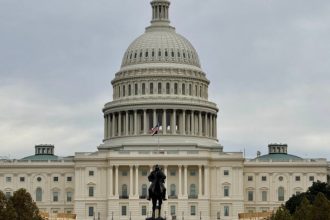Unlock the Editor’s Digest for free
Roula Khalaf, Editor of the FT, selects her favourite stories in this weekly newsletter.
The US is rushing to strengthen Taiwan’s defences against a potential Chinese attack, including by training its troops, Taipei’s top national security official has said in remarks that are likely to rankle Beijing as Xi Jinping prepares for a summit with President Joe Biden.
Washington’s security co-operation with Taiwan covered “all aspects”, said Wellington Koo, secretary-general of President Tsai Ing-wen’s National Security Council, in his first briefing with foreign journalists on Tuesday. “They are not just discussing it with us but taking action.”
“[Our] relationship on these security issues is so close, but we must keep a low profile,” said Koo. “I can only say, they are using all possible ways to help us, no matter if it’s in training or the build-up of asymmetric fighting capabilities.”
Taipei’s public confirmation of Washington’s urgent assistance and the reference to training Taiwanese forces could create additional friction when Biden meets Xi at the Asia-Pacific Economic Cooperation forum in San Francisco on Wednesday.
US law commits Washington to helping Taipei defend itself against military threats from Beijing, and it has long provided training for individual members of Taiwan’s armed forces, such as F-16 pilots.
Taipei has not previously acknowledged publicly Washington’s expansion of its assistance, including the training of entire battalions from Taiwan’s ground forces in the US.

China claims Taiwan as part of its territory and has threatened to take it by force if Taipei resists unification indefinitely. Over the past few years, Beijing has mounted a growing military intimidation campaign against the country and accused the US of meddling in what it believes is a domestic issue.
Xie Feng, China’s ambassador to the US, said last week that the superpowers needed to manage their differences and “properly handle the Taiwan issue”.
But Koo said there was no room for compromise. “The Chinese side will of course not make any concessions [on the Taiwan question],” he said. “But the US cannot make any concessions to China on it either because it is a core interest to the US.”
Koo’s rare public remarks underline how vital US support is for Taiwan, especially as the latter prepares for presidential elections in January. Some Taiwanese observers have warned that there is a risk the Biden administration will seek to reassure Beijing by toning down support for Taipei, or that candidates in next year’s US presidential election will use Taiwan to provoke China.
“Next year is a year of uncertainty,” Koo said, citing Beijing’s reaction to Taiwan’s presidential vote, the Israel-Hamas war, the war in Ukraine and the US elections.
He said China was certain to increase the pressure if Taiwan’s election was won by Lai Ching-te, vice-president and candidate of the ruling Democratic Progressive party. The Chinese Communist party has already denounced Lai as a separatist.
“I don’t think that China is already prepared to take military action against us after the election results come out on January 13,” Koo said. “We have not seen that they are making preparations or have the capability for that yet.”
But an escalation of so-called grey zone operations — hostile moves below the threshold of war — was “unavoidable, including an increase in the scale of military intimidation or economic coercion”, he added.
Taiwan’s opposition Kuomintang blames Tsai’s government for the deadlock across the Taiwan Strait, but Koo claimed even a KMT election victory would not lead to a resolution.
The KMT embraces the notion that Taiwan is part of a broader Chinese nation but disagrees with Beijing’s definition of the state that represents it.
“Maybe the level of China’s grey zone operations will slightly ease [in the event of a KMT victory],” Koo said. But he added that public opinion would not allow the KMT to acquiesce to Beijing’s insistence that Taiwan be united under the “one country, two systems” formula used for Hong Kong, and so “our positions are in fact almost the same”.
Read the full article here




